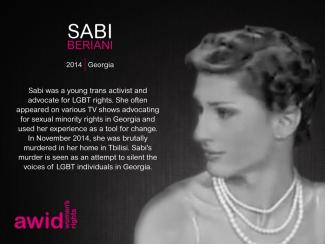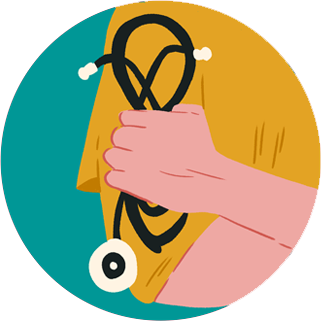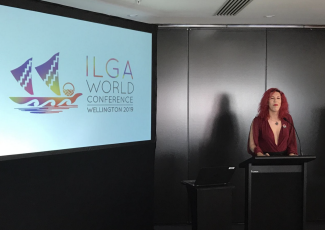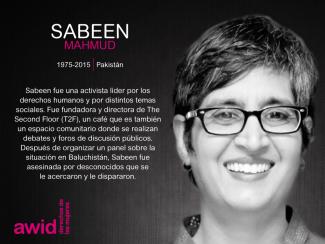
Sabi Beriani

Defensoras de derechos humanos de todo el planeta defienden sus tierras, medios de subsistencia y sus comunidades ante las industrias extractivas y el poder corporativo. Ellas hacen frente a fuertes intereses económicos y políticos que promueven el robo de tierras, el desplazamiento de comunidades, la pérdida de los medios de subsistencia y la degradación del medioambiente.
El extractivismo es un modelo económico y político de desarrollo que mercantiliza la naturaleza y prioriza la ganancia por sobre los derechos humanos y el medioambiente. Arraigado en la historia colonial, refuerza las desigualdades sociales y económicas tanto a nivel local como global. Muchas veces, las mujeres negras, rurales e indígenas son las más afectadas por el extractivismo, y además son notablemente excluidas de la toma de decisiones. Desafiando estas fuerzas patriarcales y neocoloniales, las mujeres se alzan en defensa de los derechos, las tierras, las personas y la naturaleza.
Las defensoras que enfrentan a las industrias extractivas, experimentan una diversidad de riesgos, amenazas y violaciones, incluidas la criminalización, la estigmatización, la violencia y laintimidación. Sus historias dan cuenta de marcados aspectos de violencia sexual y de género. Entre los perpetradores se incluyen autoridades estatales y locales, las corporaciones, la policía, el ejército, las fuerzas paramilitares y de seguridad privada, y en algunos casos, sus propias comunidades.
AWID y la Coalición Internacional de Mujeres Defensoras de Derechos Humanos (WHRDIC por su sigla en inglés) tienen el placer de anunciar «Defensoras de derechos humanos confrontado al extractivismo y al poder corporativo»; un proyecto interregional de investigación que documenta las experiencias vividas por las defensoras de Asia, África y América Latina.
Alentamos a activistas, integrantes de movimientos sociales, la sociedad civil organizada, donantes y responsables de políticas públicas, a leer y utilizar estas producciones para el trabajo de incidencia, con fines educativos y como fuente de inspiración:
«Defensoras de derechos humanos confrontando a las industrias extractivas: un panorama de los riesgos críticos y las obligaciones en materia de derechos humanos» es un informe sobre políticas desde la perspectiva de género (en inglés, pronto disponible en español). Analiza las formas de violaciones y los tipos de perpetradores, hace referencia a las obligaciones relevantes en derechos humanos e incluye recomendaciones de políticas para los estados, corporaciones, la sociedad civil y donantes.
«Tejiendo la Resistencia a través de la Acción: Las Estrategias de las Defensoras de Derechos Humanos contra a las Industrias Extractivas» es una guía práctica que expone formas creativas y deliberadas de acción, tácticas exitosas e inspiradoras historias de resistencias.
El video «Defendiendo a las Personas y al Planeta: Mujeres Confrontando a las Industrias Extractivas» está protagonizado por defensoras de derechos humanos de África, Asia y América Latina, que comparten sus luchas por la tierra y la vida, y hablan de los riesgos y desafíos que enfrentan en su activismo.
«Desafiar al poder corporativo: Las luchas por los derechos de las mujeres, la justicia económica y de género» es un informe de investigación que explica los impactos del poder corporativo y ofrece ideas sobre estrategias de resistencia.
AWID reconoce con gratitud las invaluables contribuciones de cada Defensora de Derechos Humanos que ha sido parte de este proyecto. Esta guía ha sido posible gracias su generosidad y apertura al compartir sobre sus experiencias y lecciones. Su coraje, creatividad y resiliencia son una inspiración para todxs nosotrxs. ¡Muchas gracias!
Nuestro nuevo documento de investigación El diablo se esconde en los detalles aborda la falta de conocimientos sobre los fundamentalismos religiosos en el sector del desarrollo, y se propone comprender mejor de qué manera estos fundamentalismos inhiben el desarrollo y, en particular, los derechos de las mujeres. Propone recomendaciones para que quienes trabajan en temas de desarrollo desafíen la labor de los fundamentalismos y eviten fortalecerlos inadvertidamente. [CTA download link: Leer el documento completo]
| Graphic1 | 1. Control of women’s bodies, sexuality, and choice are “warning signs” of rising fundamentalisms. |
| 2. Neoliberal economic policies have a particularly negative impact on women, and fuel the growth of religious fundamentalisms. | Graphic2 |
| Graphic3 | 3. Choosing religious organizations as default for partnerships builds their legitimacy and access to resources, and supports their ideology, including gender ideology. |
| 4.Everyone has multiple identities and should be defined by more than just their religion. Foregrounding religious identities tends to reinforce the power of religious fundamentalists. | Graphic4 |
| Graphic5 | 5. Religion, culture, and tradition are constantly changing, being reinterpreted and challenged. What is dominant is always a question of power. |
| 6. Racism, exclusion, and marginalization all add to the appeal of fundamentalists’ offer of a sense of belonging and a “cause”. | Graphic6 |
| Graphic7 | 7. There is strong evidence that the single most important factor in promoting women’s rights and gender equality is an autonomous women’s movement. |
El Diablo se esconde en los detalles proporciona detalles de las graves violaciones a los derechos humanos y, en particular, de las violaciones a los derechos de las mujeres, causados por los fundamentalismos auspiciados por los Estados, así como por actores fundamentalistas no estatales como milicias, organizaciones comunitarias confesionales e individuos. La profundización fundamentalista de normas sociales atávicas y patriarcales está provocando el aumento de la violencia contra las mujeres, las niñas y las defensoras de derechos humanos (WHRDs). El informe propuesta estas ideas clave para abordar el problema:
Quienes trabajan en el desarrollo están de capacidad de asumir una posición más firme. Su capacidad colectiva para reconocer y enfrentar conjuntamente a los fundamentalismos religiosos resulta crucial para promover la justicia social, económica y de género y los derechos humanos de todas las personas en el marco del desarrollo sostenible. Resulta fundamental promover que el poder y los privilegios se entiendan desde la óptica del feminismo interseccional y aplicar esta comprensión a los interrogantes sobre religión y cultura. Las organizaciones de mujeres ya poseen conocimientos y estrategias para oponerse a los fundamentalismos. Quienes trabajan en el desarrollo deberían apoyarse en estos e invertir en coaliciones enfocadas en múltiples temáticas. Lo anterior, les ayudará a alcanzar nuevos horizontes.

Rachel is a financial professional with over two decades of experience. She has overseen financial affairs and projects for private and public entities, non-profits, and international non-governmental organizations. A Chartered Accountant with a Global Master’s in Business Administration, she is also a member of the South African Institute of Chartered Accountants. In her spare time, Rachel designs typography art, enjoys traveling and spending time with family and friends over a bottle of wine.
Partagez vos histoires et écoutez celles des les autres. En reliant nos expériences, nos récits et nos propositions, nous aidons à co-créer et à amplifier les Réalités Féministes.

تلتزم جمعية حقوق المرأة في التنمية بالعدالة اللغوية ونأسف على عدم توفر الاستطلاع بلغات أخرى في الوقت الحالي. إن كنتم/ن بحاجة لدعم من مترجم/ة أو أردتم/ن تعبئة الاستطلاع بأي لغة أخرى، الرجاء الكتابة لنا عبر البريد الالكتروني: witm@awid.org
Avec une carrière juridique de plus de 30 ans à son actif, Oby était connue en Afrique et dans le monde comme une ardente défenseure de la justice de genre et des droits humains.
Elle a fondé le Centre de documentation et de développement des ressources civiles (CIRDDOC), une ONG nigériane qui sponsorise des formations et des activités de mise en réseau qui promeuvent les droits humains, la bonne gouvernance, l’accès à la justice et l’État de droit pour les membres de la société civile, les parlementaires, ainsi que d’autres parties prenantes concernées.
Au Nigeria, les activistes se souviennent d’Oby avec émotion, la qualifiant « d’activiste extraordinaire qui a fait preuve d’énergie et de passion pour lutter pour l’égalité de genre et la justice de genre au Nigéria et en Afrique »

Learn more about Feminist Realities
Any questions? Please do not hesitate to contact us
Most Member States of the European Union have laws and practices that either criminalize or control sex workers in ways unacceptable to them. Criminalization of sex workers and/or their clients only contributes to increase the vulnerability of sex workers, who are already facing stigma, discrimination and exclusion from society on a daily basis. In Spain for example, the government is currently trying to pass an Organic Law for the Abolition of Prostitution, which will result in more clandestiny and violence. Let’s dive into the stories of sex workers and union organizers fighting to decriminilaze sex work and advance their labor rights.
We believe in a full application of the principle of rights including those enshrined in international laws and affirm the belief that all human rights are interrelated, interdependent and indivisible. We are committed to working towards the eradication of all discriminations based on gender, sexuality, religion, age, ability, ethnicity, race, nationality, class or other factors.

Ориентировочное время для завершения опроса составляет 30 минут.
Marielle was a Brazilian politician, feminist, lesbian and human rights activist.
Marielle was an outspoken critic of police brutality and extrajudicial killings. Her openly feminist, Black and favela-centered politics were a source of hope for marginalized groups in Rio de Janeiro, currently governed by a conservative city government and an evangelical mayor.
On March 14, 2018, after delivering a speech in Rio de Janeiro, Franco and her driver were shot multiple times and killed. Following news of her death crowds took to the streets shouting "Marielle presente!" (Marielle is here!) and demanding justice be done.
Read more about Marielle and the situation in Brazil

La cadre des Réalités Féministes du Forum repose sur six points d’ancrages thématiques. Chaque point d’ancrage met les réalités, les expériences et les visions féministes au coeur du continuum entre résistance et proposition, lutte et alternative. Nous cherchons à explorer ensemble ce qui constitue nos réalités féministes et ce qui leur permet de se répandre dans les différentes sphères de nos vies.
Ces réalités se manifestent sous forme de modes de vie pleinement articulés, de rêves et d'idées en devenir, ou encore d'expériences et de moments précieux.
Plus que des thèmes isolés, les points d’ancrage sont des conteneurs interconnectés à l’effet des activités du Forum. Nous prévoyons de nombreuses activités à l’intersection de ces thèmes, des différentes luttes, communautés et mouvements. Encore provisoires, les descriptions continuent d’évoluer au fur et à mesure que le parcours des Réalités Féministes se poursuit.
Ce point d’ancrage met l’accent sur la façon dont nous répondons à nos besoins fondamentaux et assurons les ressources qui nous sont nécessaires pour prospérer, en tant qu’individus, communautés et mouvements, d’une manière qui prenne soin des personnes et de la nature en priorité. Nous entendons par “ ressources ” l’alimentation, l’eau et l’air pur, ainsi que l’argent, le travail, l’information, la connaissance, le temps et autres.
S’appuyant sur la résistance féministe face au système économique d’exploitation et d’extractivisme, ce point d’ancrage met en lumière les propositions, expériences et pratiques féministes puissantes et inspirantes concernant l’organisation de notre vie économique et sociale. L’alimentation et la souveraineté alimentaire ainsi que les visions féministes du travail et des systèmes commerciaux justes et durables ne constituent que quelques-unes des questions qui feront l’objet de notre exploration. Nous ferons courageusement face aux contradictions qui émergent de la nécessité de survivre dans des systèmes économiques répressifs.
Ce point d’ancrage intègre le financement et le ressourcement pour les organisations et les mouvements dans une vaste analyse féministe de la justice économique et de la création de richesses. Il examine comment déplacer les ressources là où elles sont nécessaires, de la justice fiscale et du revenu de base à différents modèles de philanthropie et au ressourcement créatif et autonome des mouvements.
Nous cherchons à créer de nouvelles visions et à amplifier les réalités et les expériences existantes en termes de gouvernance féministe, de justice et de responsabilisation. Face à la crise mondiale et à la montée du fascisme et du fondamentalisme, ce point d’ancrage se concentre sur les modèles, les pratiques et les idées féministes, radicales et émancipatrices d’organisation de la société et de la vie politique, à l’échelle locale et mondiale.
Ce point d’ancrage explorera les aspects de la gouvernance, depuis les expériences féministes du municipalisme jusqu'à nos visions du multilatéralisme, en passant par la construction d'institutions situées à l’extérieur des États-nations. Nous échangerons nos expériences concernant les processus judiciaires et de responsabilisation au sein de nos communautés, nos organisations et nos mouvements, notamment les modèles de justice réparatrice, communautaire et transformatrice qui rejettent la violence étatique et le complexe carcéro-industriel.
En nous concentrant sur les expériences de voyages, de migrations et de refuges ainsi que sur l’organisation féministe, nous voulons un monde sans régimes frontaliers mortels; un monde où la circulation y est libre et les voyages passionnants.
Le rôle de la technologie dans nos vies ne cesse de croître et la frontière entre les réalités en ligne et hors ligne continue de s’estomper. Les féministes se servent largement des technologies et des espaces en ligne pour construire la communauté, apprendre les un-e-s des autres et mobiliser l’action. Grâce aux espaces en ligne, nous pouvons repousser les limites de notre monde physique. En revanche,, les communications digitales appartiennent majoritairement à des sociétés n’assumant qu’une part de responsabilité mineure vis-à-vis des utilisateurs-trices : l’exploration de données, la surveillance et les atteintes à la sécurité sont devenues la norme, de même que la violence et le harcèlement en ligne.
Ce point d’ancrage explore les opportunités et les enjeux féministes qui existent au sein des réalités digitales. Nous nous pencherons sur les alternatives qui se présentent face aux plateformes privées qui dominent l’horizon digital, ainsi que sur les stratégies de bien-être pour la navigation d’espaces en ligne et les utilisations de la technologie comme moyen de surmonter les problèmes d’accessibilité. Nous examinerons ce que la technologie peut apporter en termes de plaisir, de confiance et de relations.
Les réalités féministes règnent également en nous-mêmes: il s’agit de l’expérience incarnée. Le contrôle dont font l’objet notre travail, notre reproduction et notre sexualité est toujours au coeur des structures patriarcales, cis-hétéro-normatives et capitalistes. Face à cette répression, des personnes de genre, de sexualité et d’habiletés différentes organisent des rencontres, créent des espaces et conçoivent des sous-cultures destinées à la joie, à la sollicitude, au plaisir et à une profonde appréciation mutuelle et de soi-même.
Ce point d’ancrage explorera les idées, les récits, les inventions et les expressions culturelles du consentement, du pouvoir et du désir des femmes, des personnes transgenres, non-binaires, transexuelles et intersexuées dans différentes sociétés et cultures.
Nous échangerons des stratégies visant à obtenir les droits en termes de santé reproductive et la justice, et exposerons des pratiques sociales facilitatrices et respectueuses de l’autonomie, l’intégrité et la liberté corporelles. Ce point d’ancrage relie différentes luttes et différents mouvements afin de partager nos perceptions et nos expériences de ce que sont le bien-être et le plaisir.
Imaginez une planète féministe. Quel est le son de l’eau, l’odeur de l’air, le contact de la terre? Quelles sont les relations entre la planète et les êtres vivants, y compris les êtres humains? Les réalités féministes sont celles d’une justice environnementale et climatique. Les luttes féministes, autochtones, décoloniales et écologiques puisent souvent leurs racines dans des visions transformatives ainsi que dans la relation entre la nature et les êtres.
Ce point d’ancrage se concentre sur le bien-être de notre planète et s’interroge sur les façons dont les êtres humains ont interagi avec elle et l’ont transformée. Nous voulons explorer les aspects des savoirs traditionnels et de la biodiversité dans le cadre de la préservation d’une planète féministe, et acquérir des connaissances sur les pratiques féministes dans le domaine de la décroissance, la pratique des communs, les modèles d’économies parallèles, l’agro-écologie et les initiatives en termes de souveraineté alimentaire et énergétique.
Bien que nous considérions tous ces points d’ancrage comme étant reliés, celui-ci est véritablement transversal; nous vous invitons donc à ajouter une dimension organisationnelle à tous les points d’ancrage auxquels les activités que vous proposez sont liées.
Comment se déroule l’organisation féministe dans le monde aujourd’hui? Cette question porte notre attention sur les acteurs, la dynamique du pouvoir, les ressources, le leadership, les économies dans lesquelles nous sommes intégré-e-s, notre compréhension de la justice et de la responsabilisation, l'ère numérique et les expériences que nous faisons de l'autonomie, du bien-être et des soins collectifs. Nous espérons, à travers tous ces points d’ancrage, créer un espace de réflexion sincère autour de la répartition du pouvoir et des ressources et de la négociation au sein de nos propres mouvements.
Le Forum se veut bien plus qu’un événement de quatre jours. C’est un arrêt de plus dans un parcours de renforcement de mouvement autour des réalités féministes, lequel a déjà commencé et continuera bien au-delà des dates du Forum.

Nous comptons actuellement parmi nos membres plusieurs centaines d’organisations parmi les plus connues et novatrices. Les critères d’adhésion sont les mêmes que pour les personnes, mais les cotisations diffèrent et les services proposés tentent de répondre à leurs besoins particuliers.
Participé en una actividad solo para afiliadxs, y lo que me conmovió en particular fue ver cómo había espacio para que todas compartieran, y que no había ningún juicio al respecto. Toda la sesión fue enérgica y vibrante.- Kirthi Jayakumar, fundadora de The Gender Security Project, India

Absolutamente, estas perguntas são opcionais, e valorizamos o seu direito de permanecer anónimo. Queira preencher o inquérito independentemente da sua decisão de partilhar o nome do seu grupo, organização e/ou movimento e as respetivas informações de contacto connosco.